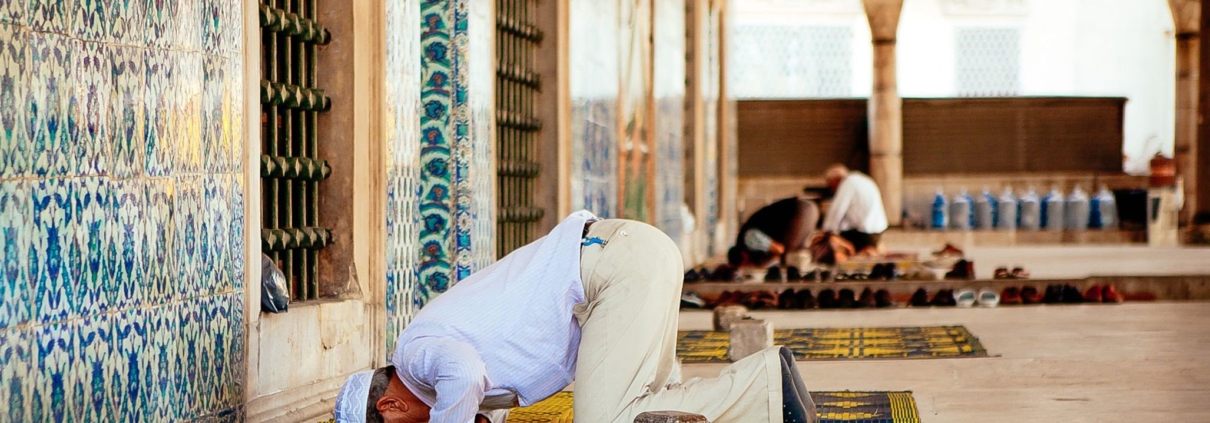How Does One Perform the Prostration of Recital?
Hanafi Fiqh
Answered by Sidi Salman Younas
Question: How does one perform a recital prostration in the Hanafi school? Is salam upon completion needed and if not is it disliked/sinful to do salam upon completion? Also, Is it permissible to perform make-up prayer during the disliked times – so if one is trying to perform make up prayers with the corresponding salah, one would pray Asr make up after Asr salah?
Answer: In the Name of Allah, the Most Gracious
I pray you are well.
1. No, in the Hanafi school one does not exit the prostration of recital with taslim and nor is it considered a sunna to do so.
The only integral of the prostration of recital is the very act of postrating itself. The validity of such a prostration is also dependent on all the conditions (shurut) of prayer being fulfilled, such as being in a state of ritual purity, facing the direction of the Qibla, having one’s nakedness covered, and so forth.
The sunna method of performing the prostration of recitation is:
[a] One recites the takbir al-tahrima without raising one’s hands and performs the prostration.
[b] Within the prostration one recites the specific invocations conveyed from the Prophet (Allah bless him and grant him peace), such as subhana rabbi al-a`la, and
[c] One says the takbir al-tahrima again and rises up.
Again, to clarify, everything mentioned above is considered a sunna act except for the prostration itself. Thus, if one merely prostrates, while fulfilling the conditions of prayer, the obligation to prostrate will be fulfilled. [Ibn `Abidin, Radd al-Muhtar; Shurunbulali, Imdad al-Fattah]
Benefit: Ibn Nujaym mentions in his Bahr al-Ra’iq that there is a difference of opinion regarding what exactly should be recited during the prostration of recital. The soundest position, he states, is to recite “subhana rabbi al a`la” as it is recited in normal prayers. This was also stated by Imam Haskafi in his Durr al-Mukhtar and mentioned by Shurunbulali in the Imdad al-Fattah, quoting Imam Sarakhsi’s Mabsut, the Mi`raj al-Dirayah, and Ibn Humam.
However, Ibn Humam mentions that one has a choice to recite other supplications conveyed from the Prophet (Allah bless him and grant him peace) within the prostration of recital if such a prostration is being performed in a supererogatory prayer or outside the prayer itself. These include:
اللَّهُمَّ اُكْتُبْ لِي بِهَا عِنْدَك أَجْرًا وَضَعْ عَنِّي بِهَا وِزْرًا وَاجْعَلْهَا لِي عِنْدَك ذُخْرًا وَتَقَبَّلْهَا مِنِّي كَمَا تَقَبَّلْتهَا مِنْ عَبْدِك دَاوُد
“Oh Allah, for this prostration write down reward for me with you, and in return for this prostration forgive my sins, and make it [the prostration] a reposit for me with you, and accept it from me like you accepted it from your slave Dawud (Allah bless him).” [Tirmidhi, Ibn Khuzayma]
Or
سَجَدَ وَجْهِي لِلَّذِي خَلَقَهُ وَصَوَّرَهُ وَشَقَّ سَمْعَهُ وَبَصَرَهُ بِحَوْلِهِ وَقُوَّتِهِ
“My face prostrates to the one who created it and shaped it and gave it the ability to hear and see by His might and Power.” [Abu Dawud, Tirmidhi]
2. It would be valid to pray make-up prayers after `Asr if it is not during the disliked time.
It is not permitted to make-up prayers during three times:
a. When the sun is rising,
b. When the sun is at it’s zenith, and
c. When the sun is setting.
At all other times, make-up prayers will be valid to perform. Therefore, if you pray your make-up prayers after `Asr but before the sun begins to set, defined as the time when one is able to look at the sun without it overwhelming and dazzling one’s eyes (roughly the last 25-30 minutes of `Asr time), then it would be valid. Otherwise, it will not be considered valid. [Shurunbulali, Imdad al-Fattah]
And Allah Knows Best
Wasalam
Salman
Checked & Approved by Faraz Rabbani
